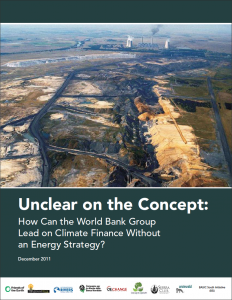- Blog
- Food & Agriculture
- World Bank: Clean up dirty energy financing
World Bank: Clean up dirty energy financing

Donate Now!
Your contribution will benefit Friends of the Earth.
Stay Informed
Thanks for your interest in Friends of the Earth. You can find information about us and get in touch the following ways:
As negotiators from around the world gather in Durban, South Africa for the latest round of climate talks, Friends of the Earth and our allies released a report today titled Unclear on the Concept. The key question we explore is, “How Can the World Bank Group Lead on Climate Finance without an Energy Strategy?”
The World Bank is strongly positioning itself to be the manager of the Green Climate Fund, which will be a point of debate in Durban. Climate negotiators agreed to set up the GCF at last year’s global climate talks in Cancun, Mexico, and the stated goal is to raise $100 billion annually in climate finance. Climate finance refers to money to help developing countries adapt to the impacts of climate change and transition to lower carbon development paths. Under the UN Framework Convention on Climate Change, wealthy countries are obligated to provide climate finance to poor countries, in recognition of the fact that the poor did little to cause the climate crisis, but will suffer some of its worst effects.
While there are serious questions about whether the fund will actually be capitalized at that level, the World Bank is making a serious play to control the GCF. Doing so will increase the World Bank’s power in the developing world, and help it compete with increasingly influential development financiers such as state-owned banks from China and Brazil. Managing the GCF would also give the Bank a new rasion d’etre, at a time when many are questioning the Bank’s utility, particularly when it comes to fulfilling its own mission of sustainable development and poverty alleviation. Study after study has confirmed that the World Bank’s record of development effectiveness, particularly when it directs money to the private sector, is checkered at best.
But the real irony of the World Bank’s power grab is that it is a huge backer of fossil fuel projects around the world, something we pointed out in a 2010 report. This seriously undermines the Bank’s credibility when it comes to helping developing countries transition to a lower-carbon future. Just last year, the Bank gave a massive $3 billion loan to a coal project in South Africa, and it is now considering a loan to build another big coal fired power plant (using lignite, one of the dirtier forms of coal) in Kosovo. Our allies in the developing world also insist that the World Bank should stay out of climate finance because it is undemocratic, marginalizes the voices of poor countries, and a funder of projects that violate human rights. Finally, as the Unclear on the Concept report points out, the Bank hasn’t succeeded in adopting an Energy Strategy that will help them decarbonize their energy portfolio, making our colleagues at Sierra Club rightly wonder, ““How can the Bank guide the world into a clean energy future when it can’t guide itself over the next decade?”
